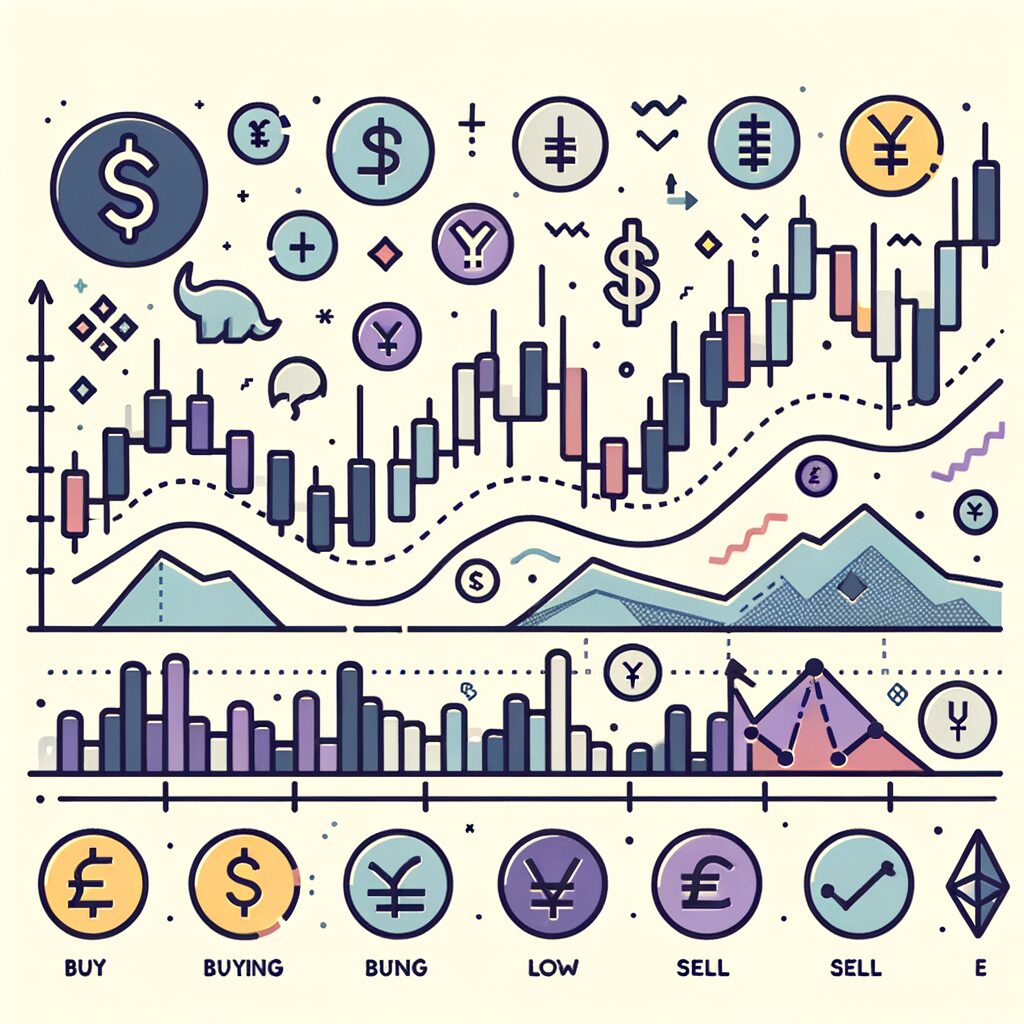
“Scalping Success: Swift Strategies for Securing Speedy Profits in the Thrill of Forex and Crypto Volatility”
Scalping Strategies: Mastering Quick Profits in Forex and Crypto Markets
Scalping in Forex and Crypto: Strategies for Making Quick Profits in Volatile Markets
In the realm of financial trading, scalping stands as a strategy that is both revered and feared for its high-paced nature and the meticulous attention to detail it demands. This technique, particularly prevalent in the Forex and cryptocurrency markets, involves making numerous trades over the course of a day, capitalizing on small price movements to accumulate profits. The allure of scalping lies in its potential for quick returns, but it requires a deep understanding of market dynamics and an unwavering discipline to execute effectively.
At the heart of scalping is the principle of leveraging volatility. Forex and crypto markets are known for their rapid fluctuations, which, while risky, provide fertile ground for scalpers to thrive. The strategy hinges on the identification of short-term trends and the execution of trades that exploit these micro-movements. Scalpers must remain vigilant, as the success of this approach is predicated on entering and exiting positions at precisely the right moments.
To navigate these turbulent waters, scalpers often employ technical analysis as their compass. By analyzing charts and employing various indicators such as moving averages, Bollinger Bands, and stochastic oscillators, they can discern patterns and signals that suggest imminent price movements. Moreover, the use of trading bots and algorithms has become increasingly popular, as they can execute trades with a speed and accuracy that surpasses human capabilities.
Risk management is another cornerstone of successful scalping. Given the high volume of trades and the slim margins for profit, even a small oversight can lead to significant losses. Therefore, scalpers must set strict stop-loss orders to protect their capital from adverse market shifts. Additionally, they must be mindful of their exposure and refrain from overleveraging, as the amplified effects of leverage can both magnify gains and exacerbate losses.
The psychological aspect of scalping cannot be overstated. The fast-paced nature of this strategy can be both exhilarating and exhausting. Scalpers must maintain a level head and resist the emotional pitfalls of overtrading or chasing losses. Discipline is paramount; a successful scalper adheres to their trading plan with unwavering commitment, knowing when to take profits and when to cut losses without succumbing to the heat of the moment.
Furthermore, the choice of broker is critical for scalpers. They require platforms that offer low spreads, fast execution speeds, and minimal slippage to ensure that trades are executed at the desired prices. The technological infrastructure of the broker must be robust enough to handle the high frequency of trades without system lags or downtime, which can be detrimental to the scalping strategy.
In conclusion, scalping in the Forex and cryptocurrency markets is a strategy that offers the potential for quick profits but demands a high level of expertise and control. It is a game of precision, where success is measured in the accumulation of small gains over time. Scalpers must master the art of technical analysis, exercise stringent risk management, and maintain psychological fortitude to navigate the volatile waters of these markets. With the right tools, discipline, and a clear strategy, scalping can be a lucrative endeavor for those who are up to the challenge.
Intraday Trading Techniques: Scalping for Consistent Earnings in Volatile Conditions

Scalping in Forex and Crypto: Strategies for Making Quick Profits in Volatile Markets
In the realm of intraday trading, scalping stands out as a strategy designed for those seeking to capitalize on the volatility of the Forex and cryptocurrency markets. This technique involves making numerous trades throughout the day, aiming to snatch small profits from minor price movements. Scalping is not for the faint-hearted; it requires quick decision-making, an unwavering attention to market trends, and a disciplined approach to risk management.
The essence of scalping lies in its focus on short-term trading. Unlike swing traders or position traders who may hold onto assets for days or weeks, scalpers operate on a much tighter timeline, often entering and exiting trades within minutes. This rapid-fire trading style is predicated on the belief that it is easier to capture small moves in the market with higher frequency than to predict large market shifts.
To effectively implement a scalping strategy, traders must first equip themselves with a thorough understanding of the market. This includes being well-versed in technical analysis, as scalping relies heavily on reading charts and identifying patterns that can signal entry and exit points. Key tools in a scalper's arsenal include moving averages, stochastic oscillators, and Bollinger bands, which help to gauge market momentum and volatility.
Moreover, the choice of a trading platform is crucial for a scalper. The platform must be capable of executing trades swiftly and reliably, as even a slight delay can be the difference between profit and loss. Additionally, the cost of trading—reflected in the spread or commission—must be low enough to ensure that the frequent trades do not erode the potential profits.
Risk management is another cornerstone of successful scalping. Given the high volume of trades, it is imperative to maintain strict control over potential losses. Scalpers often employ tight stop-loss orders to automatically close a position if the market moves against them, thereby limiting their exposure. Similarly, they set conservative profit targets, ensuring that they lock in gains before the market can reverse.
The volatile nature of the Forex and cryptocurrency markets provides a fertile ground for scalping. Price fluctuations can occur rapidly due to economic reports, geopolitical events, or changes in market sentiment. Scalpers exploit these short-lived price changes, often indifferent to the underlying reasons behind the movements. Their primary concern is to identify a trend, however brief, and ride it for a quick profit.
Despite its potential for quick gains, scalping is not without its challenges. The high level of concentration and discipline required can be mentally taxing. Furthermore, the cumulative effect of transaction costs and the risk of slippage—when a trade is executed at a different price than expected—can diminish profitability.
In conclusion, scalping is a dynamic and intensive trading strategy that can yield consistent earnings in the volatile conditions of the Forex and cryptocurrency markets. It demands a combination of analytical skill, technological proficiency, and psychological fortitude. For those traders who can master the art of scalping, the rewards can be substantial, but they come with the caveat of commensurate risks. As with any trading approach, success in scalping requires not only the right techniques but also a steadfast commitment to continuous learning and adaptation in the face of ever-changing market dynamics.
The Art of Scalping: Achieving Quick Profits with Volatility Trading in Forex and Crypto
Scalping in Forex and Crypto: Strategies for Making Quick Profits in Volatile Markets
In the realm of financial trading, scalping stands as a strategy that is both revered and misunderstood. It is a method that requires precision, discipline, and an intimate understanding of market volatility. Scalping is particularly popular in the Forex and cryptocurrency markets, where rapid price movements can offer numerous opportunities for traders to profit from small price changes over a short period.
At its core, scalping involves making numerous trades within a single day, capitalizing on minor price gaps that are often caused by order flows or market sentiment. Scalpers, as practitioners of this strategy are known, aim to enter and exit trades quickly, sometimes within minutes or even seconds, to snatch a profit from slight market movements. This approach contrasts with more traditional trading strategies that typically hold positions for longer periods, seeking to benefit from more substantial price shifts.
The volatile nature of the Forex and cryptocurrency markets makes them ideal for scalping. These markets are known for their high liquidity and the continuous stream of trading opportunities they present. In Forex, the immense volume of daily transactions, coupled with the 24-hour operation of the market, provides a fertile ground for scalpers. Similarly, the crypto market's inherent volatility, driven by a combination of factors including regulatory news, technological advancements, and investor sentiment, creates an environment ripe for the quick-fire tactics of scalping.
To effectively scalp in these markets, traders often rely on technical analysis and real-time data. They use various tools such as candlestick charts, moving averages, and momentum indicators to identify potential entry and exit points. Moreover, scalpers must have a keen eye for reading market trends and the ability to act swiftly on the information they gather. The use of trading platforms with high-speed execution capabilities is also crucial, as even a slight delay can turn a potential profit into a loss.
Risk management is another critical aspect of successful scalping. Given the high number of trades executed, a disciplined approach to managing potential losses is essential. Scalpers typically employ tight stop-loss orders to protect their capital from significant adverse movements. They also maintain a strict profit-to-loss ratio, often taking profits at predetermined levels to ensure that successful trades outweigh any losses incurred.
Furthermore, the psychological demands of scalping cannot be overstated. The fast-paced nature of this trading style can be stressful and requires a level of mental resilience and emotional control that not all traders possess. Scalpers must be able to maintain focus over extended periods and resist the temptation to deviate from their strategy in the heat of the moment.
In conclusion, scalping in the Forex and cryptocurrency markets is a sophisticated trading strategy that offers the potential for quick profits in volatile conditions. It demands a combination of analytical skill, technical proficiency, and psychological fortitude. While the allure of rapid gains is strong, it is important for aspiring scalpers to understand the risks and challenges involved. With the right approach, tools, and mindset, scalping can be a lucrative technique for those who master the art of volatility trading.
Advanced Scalping Strategies for Intraday Traders Seeking Quick Profits in Forex and Cryptocurrency Markets
Scalping in Forex and Crypto: Strategies for Making Quick Profits in Volatile Markets
In the realm of financial trading, scalping stands as a strategy that is both revered and feared for its high-paced nature and the meticulous attention to detail it demands. This technique, particularly prevalent in the Forex and cryptocurrency markets, involves making numerous trades over the course of a day to capitalize on small price movements. For intraday traders seeking quick profits, advanced scalping strategies can be the key to exploiting the volatility inherent in these markets.
The cornerstone of successful scalping is a profound understanding of market mechanics and an ability to react swiftly to real-time information. Scalpers must be able to interpret price action and technical indicators at a glance, making decisions in a matter of seconds. The use of leverage is common in such strategies, amplifying both potential gains and risks. As such, risk management becomes an indispensable part of the scalper's toolkit, with strict stop-loss orders and a disciplined approach to profit-taking being essential.
One advanced strategy employed by seasoned scalpers is the use of multiple time frame analysis. By examining charts of different time frames, traders can gain a more nuanced perspective of market trends and price movements. For instance, while a one-minute chart might be used for timing entries and exits, a five-minute chart could provide a broader view of the market's direction. This layered approach allows scalpers to align their trades with the prevailing momentum, increasing the likelihood of successful outcomes.
Another tactic involves exploiting economic news releases, which can cause significant volatility in Forex and cryptocurrency markets. Scalpers with a keen eye for timing can position themselves just before a major announcement, ready to ride the wave of rapid price changes that follow. However, this strategy requires an intimate knowledge of how different news events are likely to impact currency pairs or digital assets, as well as the ability to quickly interpret the results of such events.
The use of automated trading systems or algorithms is also gaining traction among scalpers. These systems can execute trades at speeds unattainable by humans, taking advantage of minuscule price discrepancies that may exist for only fractions of a second. While this approach can increase efficiency and reduce the emotional impact of trading, it also necessitates a deep understanding of both the trading algorithms and the market conditions under which they perform best.
Furthermore, scalpers often rely on a robust technological setup, including multiple monitors and a high-speed internet connection, to stay abreast of market changes. The importance of having access to real-time data and being able to execute trades without delay cannot be overstated in the fast-paced world of scalping.
Despite the potential for quick profits, scalping is not without its challenges. The high volume of trades increases transaction costs, which can erode gains if not carefully managed. Additionally, the intense focus required can be mentally taxing, making it a strategy that may not be suitable for all traders.
In conclusion, advanced scalping strategies in Forex and cryptocurrency markets offer the promise of quick profits, but they demand a high level of expertise, discipline, and technological support. Traders who choose to scalp must be prepared to commit the time and resources necessary to master this demanding approach. With the right strategies and mindset, however, scalping can be a powerful tool for capitalizing on the volatility of these dynamic markets.


